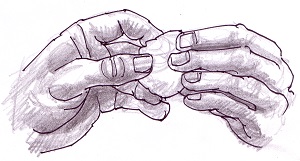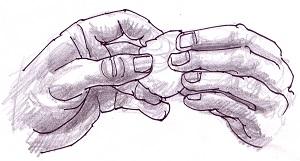

“Will you lay down your life for me?” (John13:38).
Isa 49: 1-6; Ps 71; John 13:21-33, 36-38
The words “intimate dining” only begin to describe the closeness of a meal in ancient Middle Eastern culture. Participants reclined around the table and a common dish into which they dipped pieces of bread. Their faces were so close that the term “within the nasal bubble” applied. This was real intimacy, the inner circle reserved for trusted friends or associates.
Leonardo da Vinci’s Last Supper is a European version of Jesus’ final meal with his disciples as recorded in the Gospels, but it does depict the principal players and the tensions between them. Jesus is in the center, Peter is one side of him and John, presumed to be the “beloved disciple” on the other, his head resting on Jesus’ chest. Also close enough to be handed a piece of bread dipped in the dish is Judas Iscariot, the betrayer.
It was both dinner and the commemoration of Passover, the meal of bread, bitter herbs, wine, and roasted lamb that preceded Israel’s Exodus to freedom. After Jesus’ death and resurrection, it became the Christian Passover and the central ritual of solidarity for the early faith community. To participate was to be bonded with one another as members of the crucified and risen body of Jesus by sharing the cup and the bread as Eucharist — “thanksgiving.”
Our Sunday worship has become so familiar, we benefit during Holy Week by being reminded of the personal dramas that played out at the Last Supper. Jesus’ words that someone at the table was going to betray him set off a chorus of protests: “Surely it isn’t I, Lord.” Judas is quietly identified with a morsel of bread passed to him by Jesus with the words, “What you are going to do, do quickly.” Peter, boasting of his loyalty to Jesus, is told that before the cock crows that night he will have betrayed his master three times.
Every Eucharist poses questions that probe our baptismal commitment to Jesus. Will we betray him, either deliberately or by indifference and neglect? Are we ready to lay down our lives for him? To be at the table with him is a public pledge that we will be loyal to the breaking of the bread and the one cup. We are now body and blood bound to Jesus and to one another.
But, like all the disciples on that final night, we are also frail and afraid. Judas betrays Jesus and Peter denies him. The rest flee to save themselves when Jesus is arrested. The community convened after the resurrection is made up of sinners and failures who first need to be forgiven and healed before they can be sent to proclaim God’s glory. We are invited to join them with trust in God’s unconditional and limitless mercy.
Advertisement






